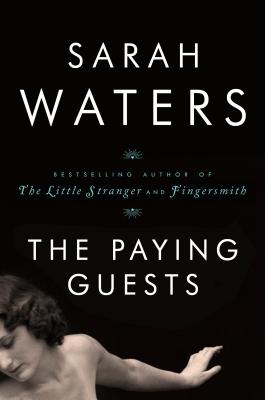I was at a party over the weekend and several people were talking about Sarah Waters’ book The Paying Guests. Everyone loved it (if you haven’t read it yet, go get it and prepare to get lost for a few days reading) and we all spoke about parts of the book we loved when my friend Hillary just started laughing. The book isn’t a comedy, by any stretch of the imagination. I asked her what was so funny and never expected her response.
It seems Hillary read the back of the book prior to starting it. Here’s where the funny comes in. The  back of the book has blurbs for all her other books. Hillary read only the review for The Little Stranger, which is a ghost story. She started her reading with that overlay in mind. “I’m a reading a ghost story,” Hillary thought as she started The Paying Guests. Well, not so much. But here’s the really interesting thing: she read through the entire first part of the book (almost 200 pages) expecting a ghost story, so she kept finding one. In her mind she could very easily see how the rundown house could become a gothic haunting. How perhaps every creak on the stairs was a deceased brother coming back to give a message to his sister. Of course, she didn’t share this at the time, she just kept that to herself silently wondering when the ghost was going to reveal him or herself. This made for an unsatisfying read because the thing she kept wanting, ghosts or supernatural occurrences, never happened.
back of the book has blurbs for all her other books. Hillary read only the review for The Little Stranger, which is a ghost story. She started her reading with that overlay in mind. “I’m a reading a ghost story,” Hillary thought as she started The Paying Guests. Well, not so much. But here’s the really interesting thing: she read through the entire first part of the book (almost 200 pages) expecting a ghost story, so she kept finding one. In her mind she could very easily see how the rundown house could become a gothic haunting. How perhaps every creak on the stairs was a deceased brother coming back to give a message to his sister. Of course, she didn’t share this at the time, she just kept that to herself silently wondering when the ghost was going to reveal him or herself. This made for an unsatisfying read because the thing she kept wanting, ghosts or supernatural occurrences, never happened.
It was until she got to the end of the first part and the two women became lovers that she realized, “Oh, this is a love story, not a ghost story!” Needless to say, when she shared this at the party all of were laughing very, very hard. This brought up a very interesting discussion about how what we think a book is going to be can be at odds with what the book actually is. And then this got me thinking about how I talk about books with kids. Am I saying too much about the book? Am I focusing on one thing and sacrificing other information that might for a better reading experience?
Kids are very good at reading the blurbs on the jackets, and most kids’ books don’t have reviews of other books on the back, but still it got me thinking about what we say about books before people start reading them and does that color the reading experience. In some cases, clearly, that’s an issue, but in others it’s not. I think the less I know about a book, the better off I am, because sometimes I latch onto a detail or idea about the book and spend my time as a reader looking for that detail, just as Hillary was looking for ghosts.
So readers, I’m curious: how much do you like to know about a book before you start reading it?

When I pick up a book to read, it’s usually because it’s on my “list”. I’ve jotted down books from reading reviews, recommendations, etc. So, I usually don’t remember what prompted me to write it down. I only read the blurb on the inside flap if I am really confused about where the book is heading after 1/4 of the way in. And I also often quit reading a book 1/4, 1/2, or even 9/10 of the way in if I’m not enjoying it. So many books, and no time to waste!
And once I read a book about halfway through wondering how much of it might be autobiographical. When I looked at the flap, it was a memoir!! So, I guess that’s my “ghost story” experience….
Somewhat related… I remember reading that jokes appearing in movies previews get the biggest laugh in the full film. Is a joke really funny the second time? Or do audiences laugh at what’s familiar? Or because they suppose that must be the best bit because it was called out?
I’ve noticed several jackets lately that give away far too much of the plot. If the jacket blurb gives away a huge plot point that doesn’t even appear until the last 50 pages, that’s too much.
It is interesting that you mention this Josie. Recently, I have been thinking about my blog reviews and wondering if I was doing a disservice in some ways. It struck me that after I read a book that was touted as having a major “twist,” I was actually reading the book differently – spending my time trying to figure out the twist and not just going on the journey.
Not sure how this will affect the reviews I write in the future, but it is a good thing to keep in mind. Thanks for bringing it up here.